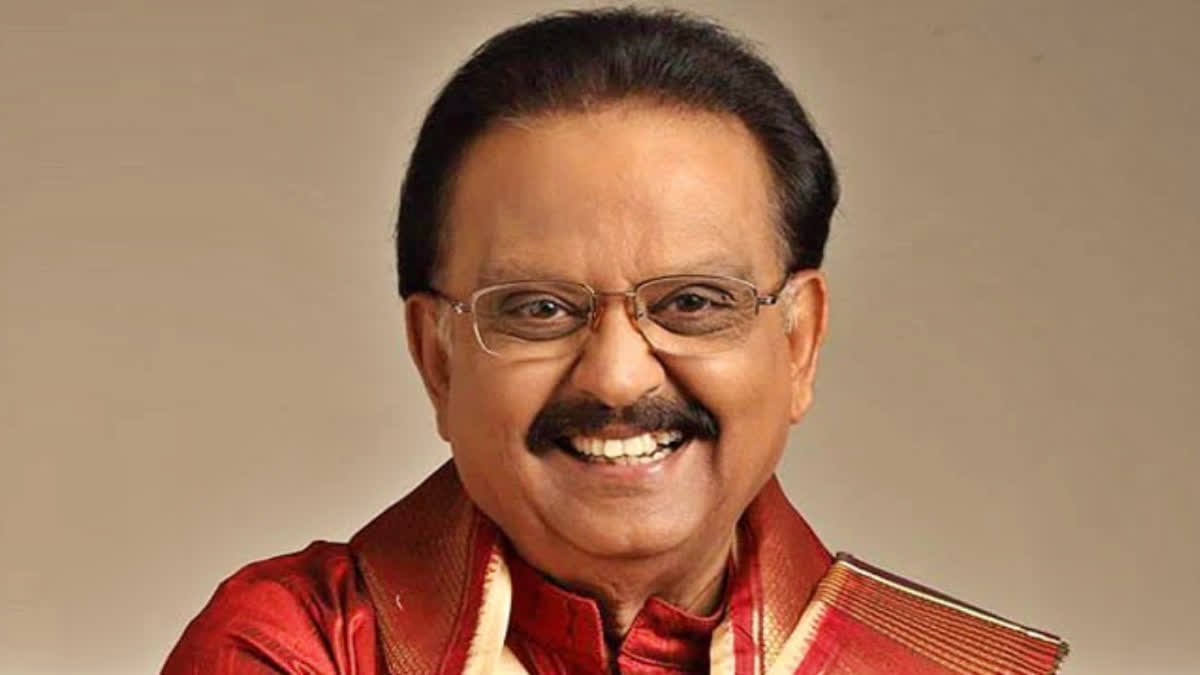Hyderabad: "I love my life. If possible, I don't want to die. I have a passion for life," Sripathi Panditaradhyula Balasubrahmanyam, fondly known as 'SPB' had said once while speaking about his spiritual inclinations yet no one can escape death, and he died three years back in COVID, creating a perpetual void in the world of music.
A trailblazing journey- SP Balasubrahmanyam's journey from a young engineering student to an iconic playback singer is a testament to his talent and determination. Born on June 4, 1946, in Nellore, Andhra Pradesh, SPB had humble beginnings and had no aspirations of entering the film industry initially.
He pursued engineering (AMIE) in Chennai, with dreams of becoming a gazetted rank engineer. However, fate had other plans for him. It was the renowned playback singer S Janaki who recognized his exceptional talent during a music competition and encouraged him to explore a career in the film industry.
In 1966, SPB's career began with Telugu and Kannada songs, thanks to the opportunity provided by S P Kothandapani, whom SPB regarded as his guru. However, his debut song in Tamil, "Athanodu Ippadi Irundhu," a duet with L R Easwari in the movie 'Hotel Rambha,' did not see the light of day.
- " class="align-text-top noRightClick twitterSection" data="">
Despite initial setbacks, SPB's determination and passion for music led him to persevere. His breakthrough came in 1969 with the Tamil film 'Adimaipen,' and he achieved widespread fame with the timeless classic "Ayiram Nilave Vaa" from the MGR starrer. This marked the beginning of an illustrious career that would span over five decades.
A musical journey like no other-SP Balasubrahmanyam's musical journey was nothing short of remarkable. What set him apart from other playback singers was his ability to effortlessly evoke a wide range of emotions through his songs. Influenced by the legendary Mohammed Rafi, SPB carved out a niche for himself in the industry, even at a time when veterans like T M Soundararajan (TMS) and P B Srinivas were dominating the scene.
What made SPB's achievements even more astonishing was his lack of formal training in classical music. His natural talent and dedication propelled him to unimaginable heights in the world of playback singing. His collaborations with iconic music directors like Kothandapani, M S Viswanathan, Ilayaraja, A R Rahman, and Deva resulted in countless chart-toppers that continue to resonate with audiences today.
Tricks not many singers have in their sleeves- SPB's versatility as a singer was unparalleled. He seamlessly transitioned between genres and languages, leaving his mark in Tamil, Telugu, Kannada, and more. His duets with female artists like P Suseela, S Janaki, Vaani Jayaram, and Chitra remain timeless classics. He possessed an extraordinary talent – the ability to whistle, mimic any sound or voice, and seamlessly incorporate stammers, laughter, coughs, or infuse emotions into songs.
Going classical-Among the countless melodies that brought solace to people's lives, songs like "Vannam Konda" and "Pehla Pehla Pyar Hai" were inseparable from their daily routines. He demonstrated his versatility by excelling in classical music, delivering a stellar performance in the 1979 blockbuster "Sankaraparanam" by K. Vishwanath, where he lent his voice to nine songs, including "Dorakuna Ituvanti Seva" and "Samaja vara gamana."
No new year eve celebrations sans SPB's number-New Year's Eve celebrations in Tamil Nadu became livelier with his peppy numbers, especially his timeless hit "Elamai Etho Etho," which became a staple. His melodious voice left an indelible mark on songs in various languages, including South Indian and Hindi. Beyond playback singing, he showcased his impressive music composition skills in movies like "Sikaram."
Rajini or Kamal? No! It's SPB- Acting and dubbing came naturally to him, evident in his roles in movies like "Midhunam," "Kadhalan," "Priyamanavaley," "Manadhil Urudhi Vendum," and "Sathya." He had the uncanny ability to mimic an actor's voice so convincingly that it seemed as if the actor himself had sung the song. He once revealed his secret, stating that a singer must be an actor to achieve such compatibility. "I have never changed my voice for Rajini or Kamal," he proudly declared years ago.
The surgery-However, his vocal cords suffered when he sang in a coarse voice for the song "Nachina foodu" in the Telugu movie 'Indrudu Chandrudu' (1989), leading to a vocal cord nodule. Despite advice to the contrary from Lata Mangeshkar, he underwent surgery and resumed singing after a hiatus.
During his illustrious 54-year career, SPB acknowledged the profound influence of veteran singer Mohammed Rafi, especially in his early years of playback singing. Although he is renowned for his impeccable Tamil diction now, it might be surprising to learn that music composer M.S. Viswanathan once told SPB that he would consider giving him an opportunity only if he improved his Tamil pronunciation. SPB humorously revealed that he learned Tamil mainly from movie posters, much to the amusement of his fans.
Busting "Mannil Intha" single breath song myth-He always believed in innovation and candidly dismissed the notion of singing a song in a single breath as a gimmick, attributing it to technological innovation. In the 1990 Tamil movie 'Keladi Kanmani,' the song "Mannil Indha" included a portion that was claimed to have been rendered "without taking a breath."
He continually reinvented himself, hosting numerous reality music shows on television for about two decades. In addition to film music, he also lent his voice to several devotional albums, with his numbers "Namashivaya" and "Shivashtakam" being particularly beloved by devotees.
SPB's love for ice cream- SPB was known for his self-deprecating humour, love for ice cream, and his status as a self-proclaimed smoker for 35 years and a social drinker. Despite the accolades that came his way as his stature grew, he remained humble and increasingly spiritual. He attributed his success to a divine gift, perhaps a connection to his past lives, as he even rendered classical compositions without formal understanding or training.
Also read: Telangana revolutionary poet and popular folk singer Gaddar passes away in Hyderabad
Also read: SPB honoured posthumously with Padma award



